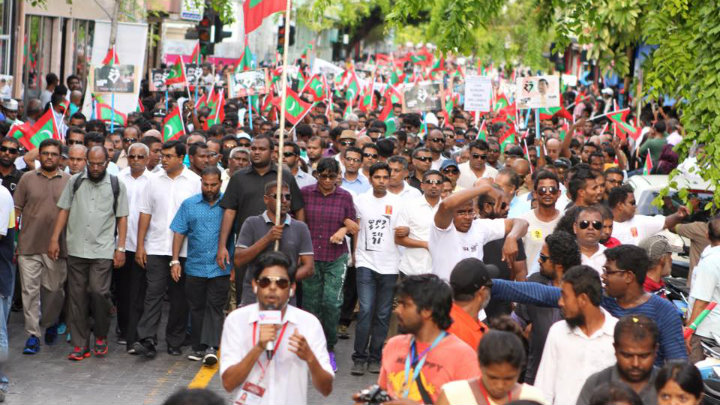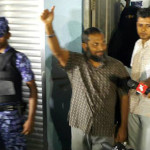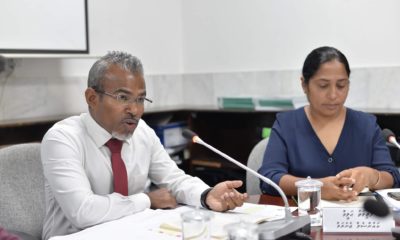Adhaalath Party leader Sheikh Imran Abdulla must bear responsibility for violent clashes between protesters and police officers during a mass anti-government demonstration on May 1 last year, state prosecutors contended today.
At today’s hearing of Imran’s terrorism trial, the prosecutor said Imran was the leading figure of the May Day rally, but had done nothing to prevent the clashes.
The 2013 freedom of assembly law states that protest organisers must take responsibility if they fail to prevent violence, the prosecutor noted.
Imran is accused of inciting violence in his speech at the 20,000-strong May Day rally. He was charged under article two of the 1990 Anti-Terrorism Act, which states that promoting fear amongst the public or causing destruction of property are acts of terrorism.
In response to the prosecution’s argument, defence lawyer Ali Zahir stressed that Imran had appealed to protesters to remain calm and not to engage in any form of violence.
Zahir, also a senior member of the Adhaalath Party, said the May Day rally was officially brought to an end at dusk, absolving Imran and the protest organisers of responsibility for the actions of individual protesters later that night.
Zahir also noted that the Adhaalath Party had made it clear to the police before the protest that it would not take responsibility for any criminal offences committed by individuals.
But the prosecutor said the Adhaalath Party had announced that the protest will take place from 3:00pm to midnight.
Scores of protesters and some police officers were injured during violent clashes on the night of May 1. The police at the time made public video footage showing protesters tripping and kicking a Specialist Operations officer and one man hitting the policeman over the head with his baton.
Sergeant Abdul Rahman Hussain was flown to Sri Lanka for medical treatment after the assault. The prosecutor general’s office had charged 13 people over the incident.
At today’s hearing, the prosecution screened video footage of the assault. The prosecution also showed the court a video of a pickup barging through a line of riot police officers blocking the path to the restricted Republic Square.
Defence lawyer Husnu Suood said in response that Imran had not ordered the protesters to attack police officers.
“An individual does not have to carry the responsibility for crimes committed by others,” the former attorney general said.
Presiding Judge Abdul Bari Yoosuf ordered the police to complete and submit the analysis reports of the video presented as evidence today.
He also announced that a hearing will be held next Monday to hear testimony from an anonymised witness for the prosecution.
Imran’s terrorism trial resumed yesterday after a five-month hiatus. Sunday’s hearing saw heated exchanges between Judge Abdul Bari Yousuf and defence lawyers.
The state prosecutor argued yesterday that Imran’s assertion that President Abdulla Yameen had no choice but to sit down for talks with the opposition constitutes an act of terrorism.
The other points raised by the prosecution included Imran’s call for protesters to sit tight until other arrangements have been made, his call for protesters to bring an end to the government’s “tyranny,” and allegations levelled at then-Tourism Minister Ahmed Adeeb and then-Police Commissioner Hussain Waheed over the disappearance of journalist Ahmed Rilwan, the brutal murder of MP Dr Afrasheem Ali, and the “framing” of former Defence Minister Mohamed Nazim.
The May Day rally saw a record turnout with protesters calling on the government to release former President Mohamed Nasheed and ex-Defence Minister Nazim.
Imran was initially arrested on the night of May 1 and released after 27 days.
He was arrested for a second time on June 1 and charged with terrorism. The court at the time ordered Imran to be held in remand detention for the duration of the trial. The trial had remained stalled after a single hearing when two of the three presiding judges were promoted to the High Court on June 8.
In July, Imran was transferred from a remand centre to a high security prison on Maafushi Island. On August 5, the chief judge of the criminal court, Abdulla Mohamed, transferred Imran to house arrest, citing health concerns.
But Judge Bari held a surprise hearing the next day and ordered Imran be taken back into state custody. He cited findings in a police intelligence report which was not shared with defence lawyers.
Imran was transferred to house arrest again in mid-October after more than 160 days in custody. Judge Bari at the time cited the state’s violation of a court order to provide access to medical care.


















